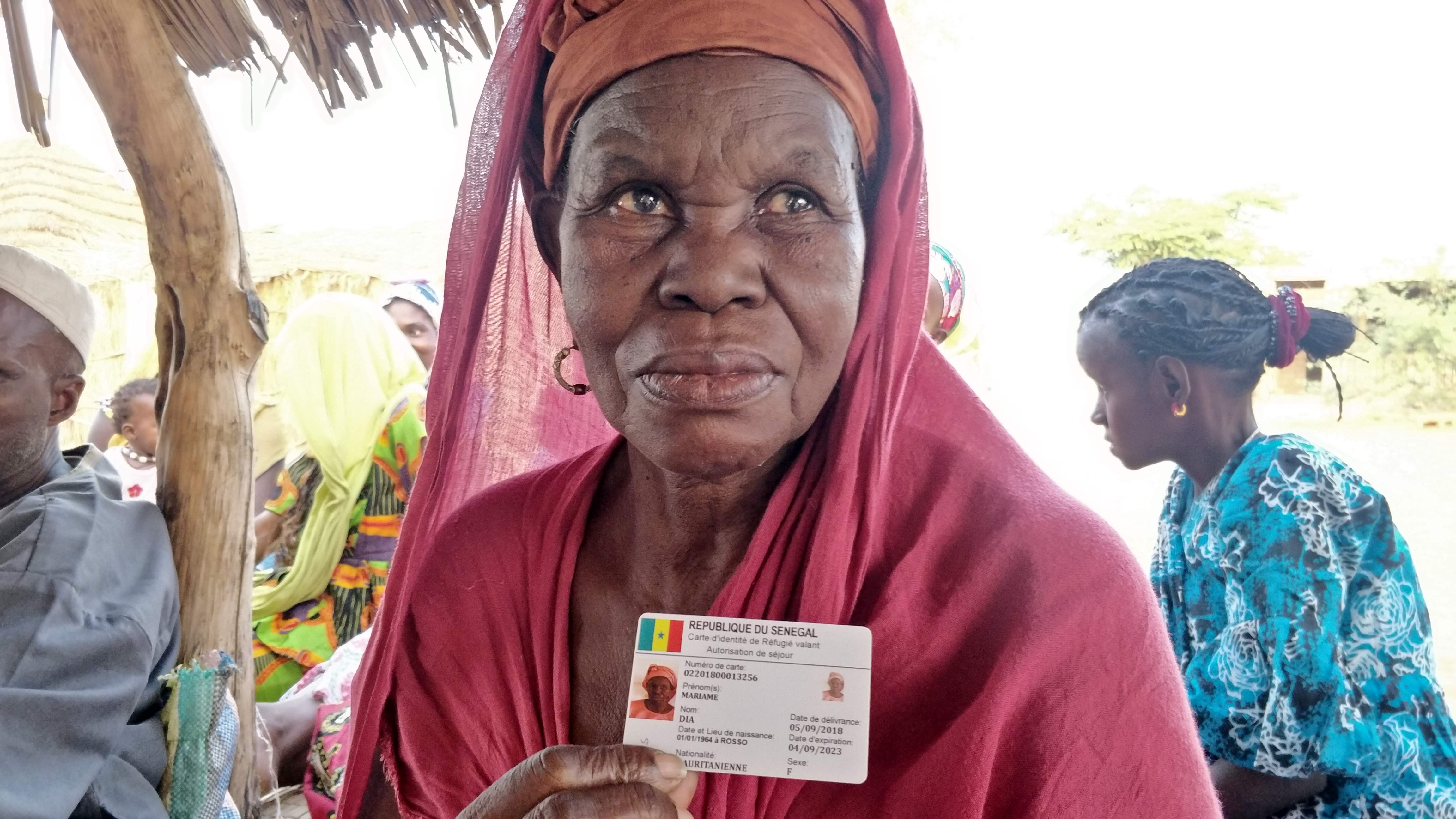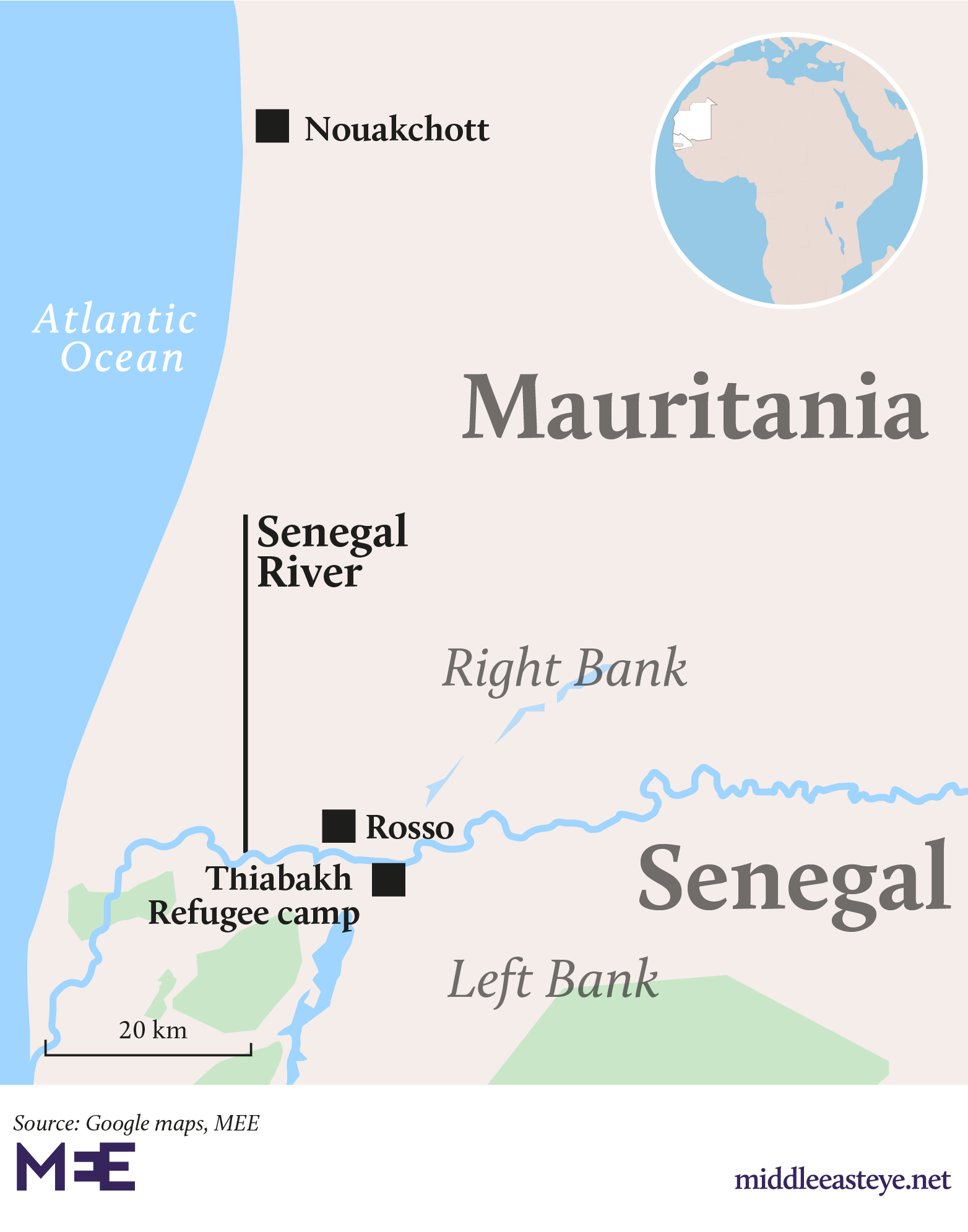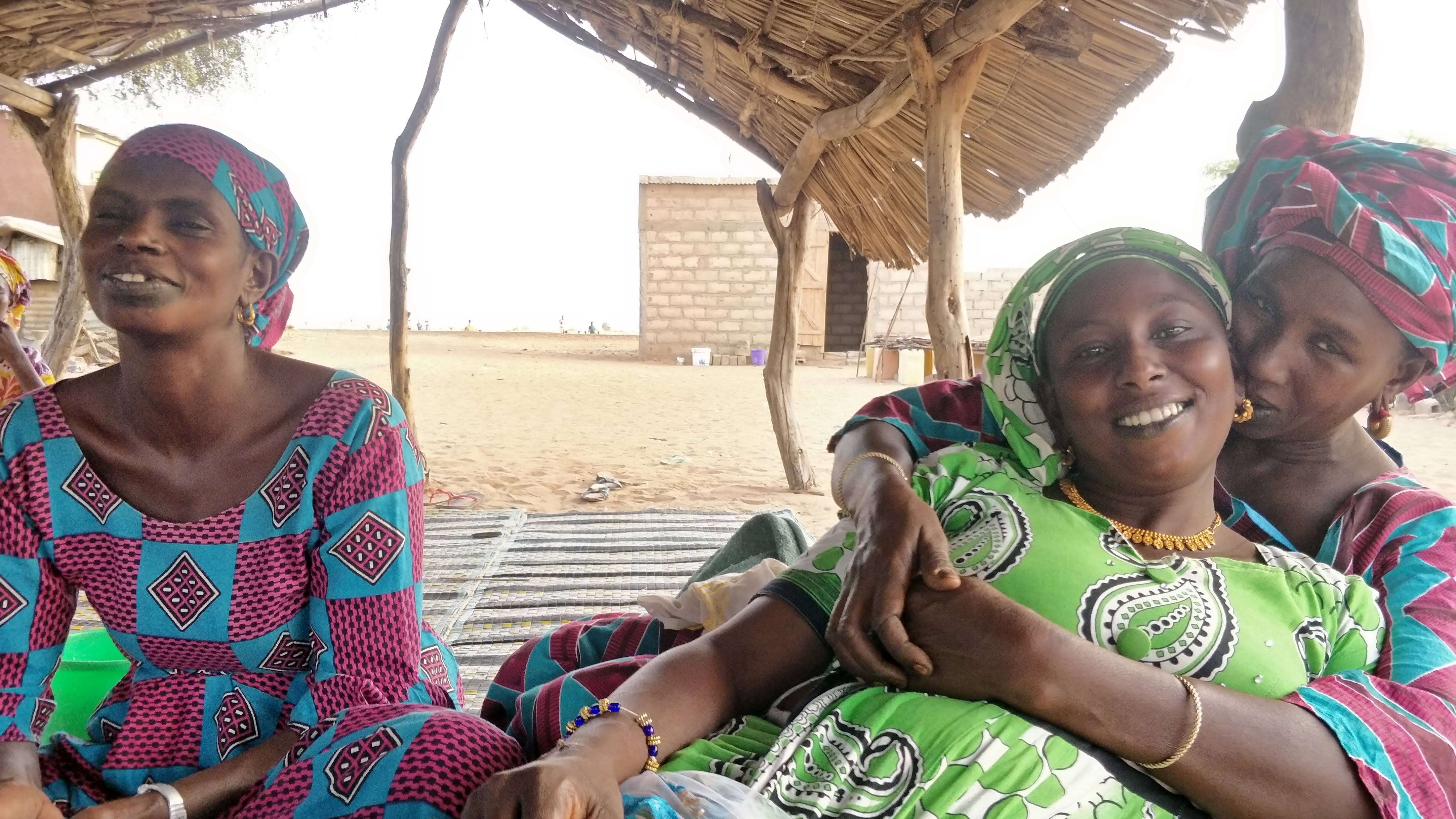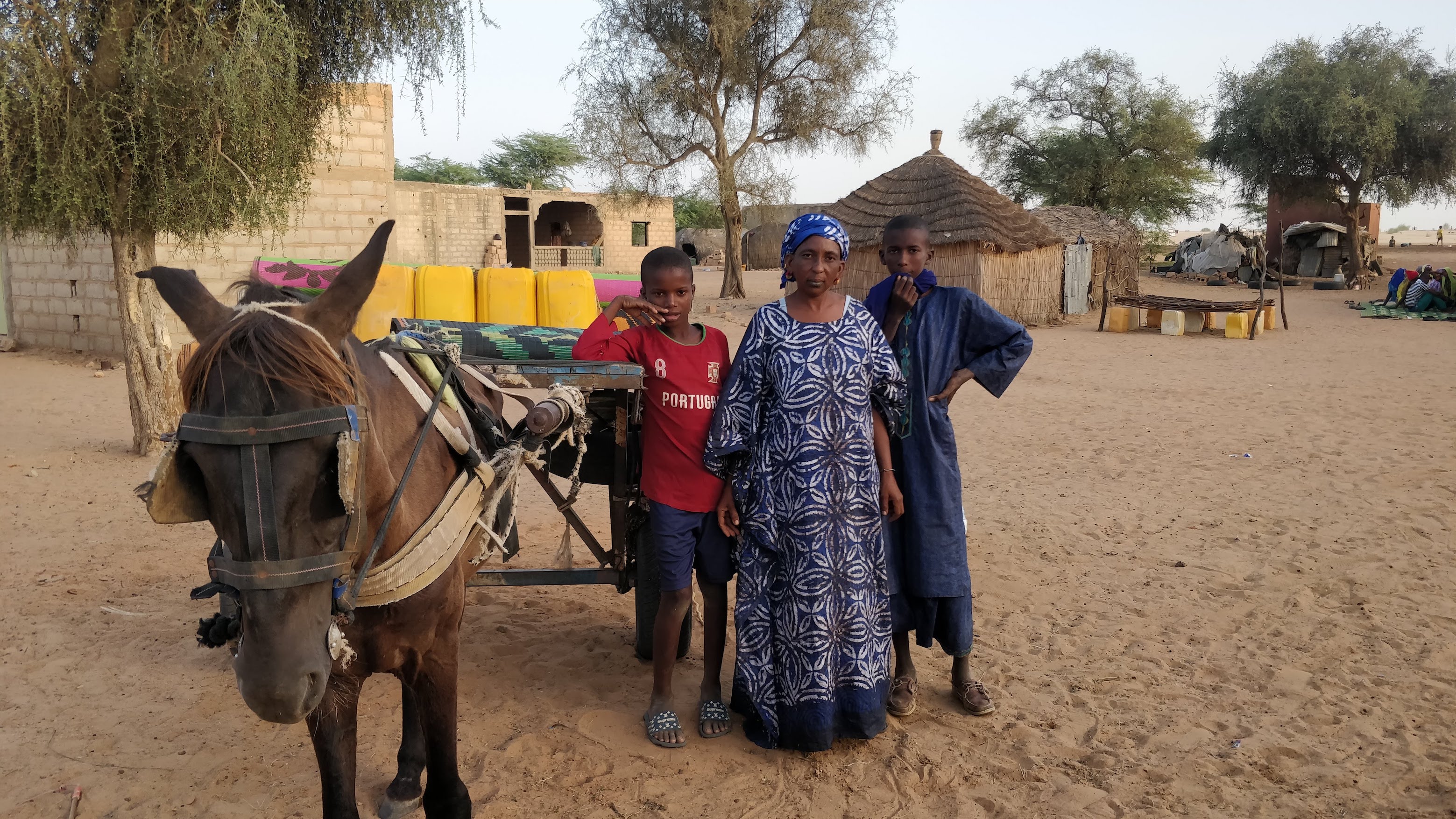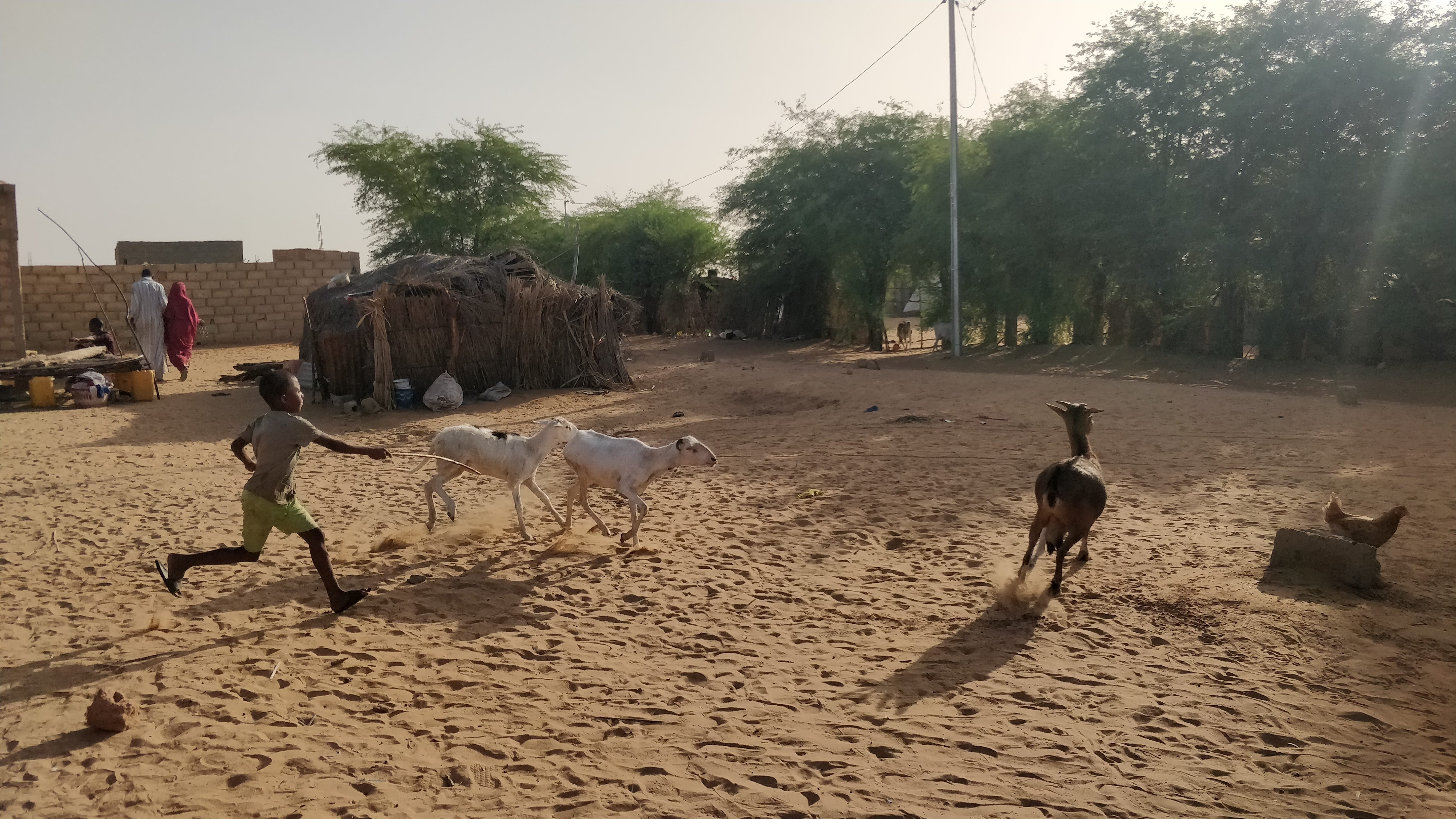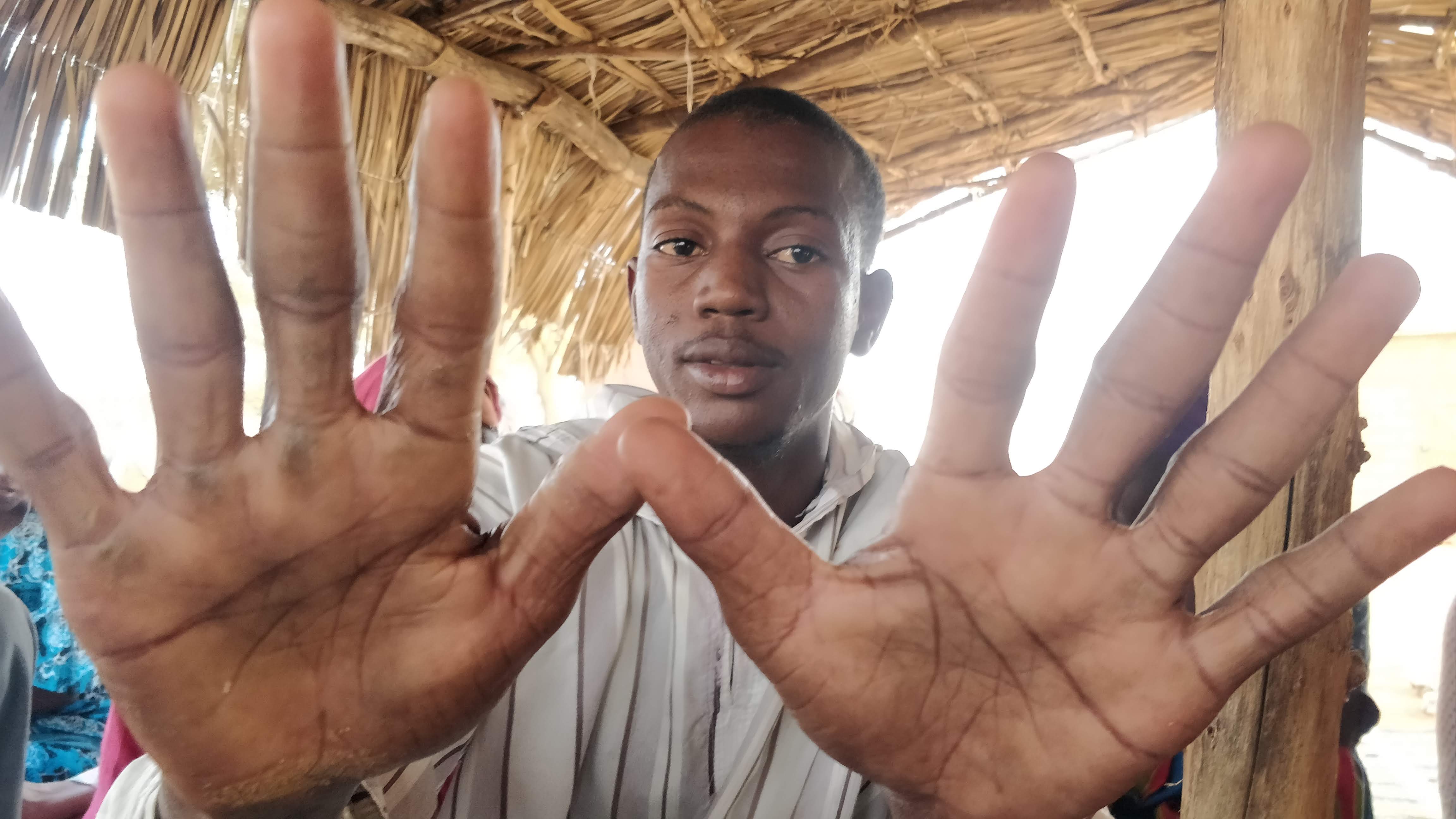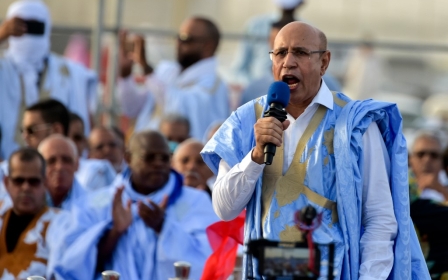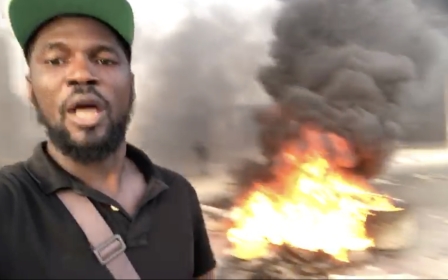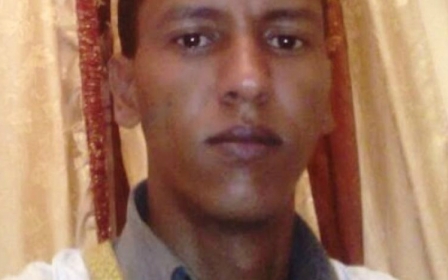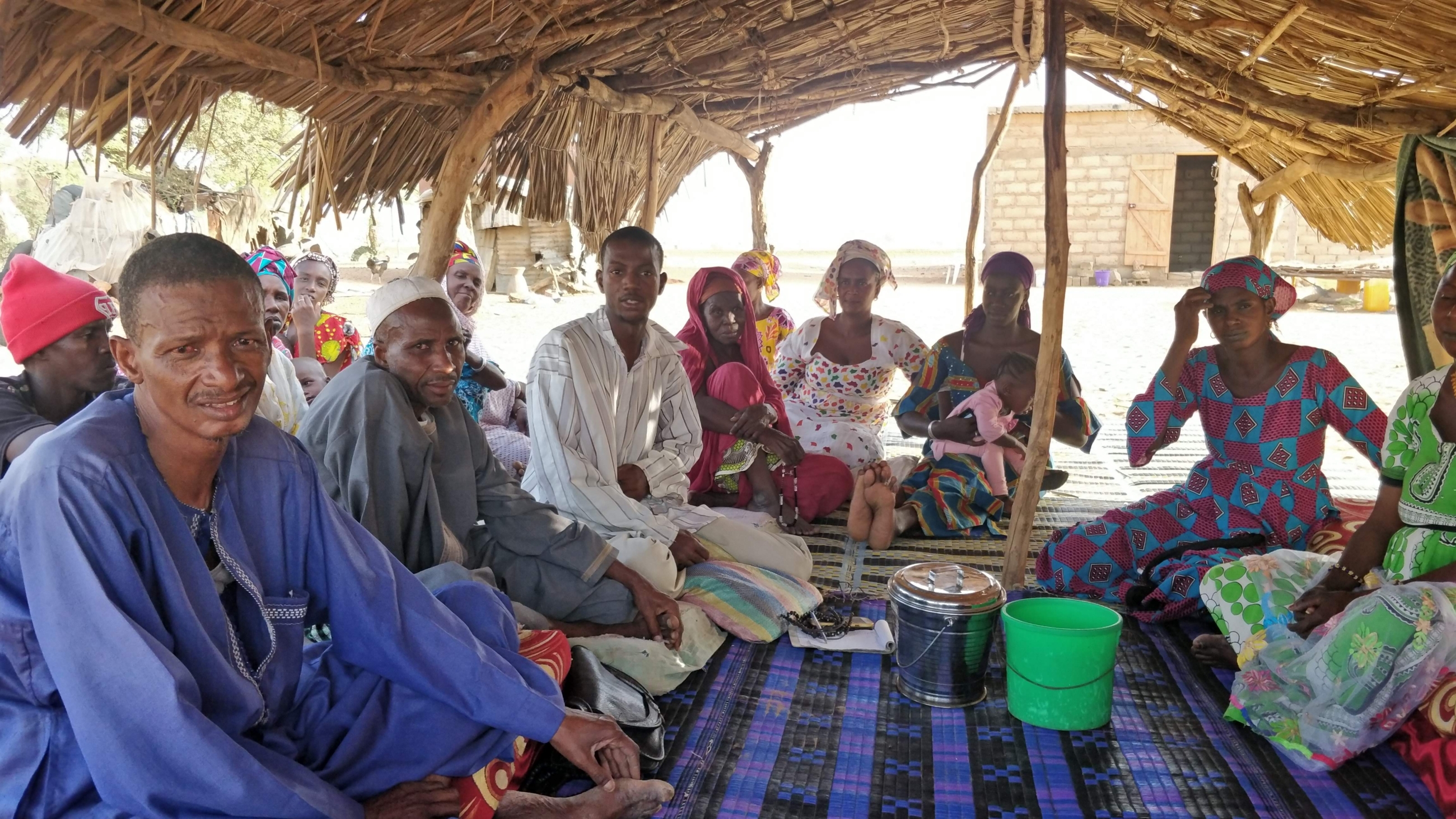
Crossing the river: Black Mauritanians haunted by mass expulsion to Senegal
Mariame Dia does not know how old she is but her worn eyes have seen enough for a lifetime.
The faces of the policemen who turned her out of her home. The despaired looks on her children's faces as they were forced to cross the river by boat. They have shed tears for the brothers and sisters she was forced to leave behind in Mauritania.
She sits cross-legged and hunched forward, using her red headscarf to wipe the dust from her eyes as she speaks.
'The police found us inside our house, bound our hands and beat my husband. They did not allow us to take anything with us, not even our clothes'
- Mariame Dia
“The police found us inside our house, bound our hands and beat my husband. They did not allow us to take anything with us, not even our clothes. Our cattle were left there,” she says.
“They made us cross the river into Senegal without anything."
New MEE newsletter: Jerusalem Dispatch
Sign up to get the latest insights and analysis on Israel-Palestine, alongside Turkey Unpacked and other MEE newsletters
Thirty years ago Mariame, along with tens of thousands of Black Mauritanians, was violently expelled in what survivors have called a “genocide”.
More than 14,000 people now live in a series of dusty refugee camps near the Senegal river that separates the two countries, a matter of kilometres away from their former homes. A similar number live in Mali.
Shortly after independence, Mauritania embarked on aggressive “Arabisation” policies, securing the racial supremacy of a tiny Arab-Berber elite at the expense of the much larger black population, many of whom it expelled en masse in 1989.
Down in the lush river valley running along the Senegal river, an oasis in the overwhelmingly desert nation, security forces sacked and burned down hundreds of villages, booting poor Fulani cattle herders off their land and setting them off on boats to the other side of the river in the middle of the night.
The forced exodus is commemorated on 28 November, a day which also marks Mauritanian's independence from France.
Ethnic Fulani people, as most here are, have ancient ties to both sides of the river, which throughout the ages has connected, but at other times acted as a barrier between, the riverine communities that live upon its banks.
Thirty years on from their ordeal, members of the community at Thiabakh refugee camp in the riverside town of Richard Toll take their time to recount their experiences and express their hopes, sitting beneath a tent made of crooked branches and dried leaves.
A trio of young women giggle at their visitor’s attempt to speak their language, while men pass around a metal tray with miniature glasses half full of frothy tea. A herd of white goats aimlessly wander in search of food and a donkey cart carrying large vats of water takes off, kicking up a cloud of dust in its wake.
Asked if she would ever cross the river to return home to Mauritania, Mariame flicks her ear, her face hardening.
“Never! I do not even want to hear of that. Never!”
Fearing the return home, they are now struggling to keep their identity alive, refusing to take on Senegalese citizenship and melt into society, because they see themselves as indigenous to Mauritania, a country which has tried to erase its black population.
But the community and their descendants now live in limbo, unable to travel, find jobs or afford medical care.
This has had particular implications for Mariame, because as she sits to talk, her eyes askew, it soon becomes clear that she can no longer see.
She has gone blind.
A river ran through it
During her childhood, the river ran through Rosso, Mariame’s town, as though it were just another street. Fishermen crossed at will in their brightly-coloured boats and Fulani herders could freely move back and forth so that their horned cattle could graze on the rich pasture which stretched down the sides of the river valley.
It was the mid-20th century, in the dying days of French colonialism, days when it hardly mattered whether you lived on the left bank or on the right, because people spoke the same languages, ate the same food and were often related to one another.
It was not always like this, however. Offering a respite from the harsh Sahara, the fertile river valley had historically been a meeting point between Arabs, Berbers and Black Africans.
Gilded African kingdoms like Takrur and Walo, straddling both banks, sealed its reputation as the “river of gold” described by medieval Arab geographers, its glittering lure proving irresistible to European explorers, traders, and later slave traders.
Arab-Berbers, also known as beydanes - literally "white men" - were the descendants of local ethnic Berbers conquered by a succession of Arab tribes arriving on camel back from the Arabian peninsula. One of those tribes, the Bani Hassan, gives its name to their language: Hassaniya Arabic.
“Mauritania was mostly desert and so migrants came to settle on the river. It was a question of life or death,” says Abderrahman Ngaide, a historian at the Cheikh Anta Diop University in Dakar, Senegal.
By the 17th century, a series of Arab-Berber emirates had come to dominate the right bank, pushing back across the river a number of Black African kingdoms, belonging to the Wolof and Fulani, ethnic groups which still dominate the valley.
Relations between the riverine communities were mixed. Arab-Berber raiders were known to sweep down from the right bank across the river, carrying back young women, men and children into the desert as slaves. This legacy of slavery still haunts Mauritania to this day.
At the same time, Fulani cattle herders were still permitted to move to and fro across the river in search of fresh pasture and to trade with farmers and fishermen, ensuring a degree of symbiosis.
Peace and security briefly appeared on the horizon in the shape of a marriage in 1825 between Muhammad al-Habib, leader of the right bank emirate of Trarza, and the heiress of Walo, a matrilineal kingdom that lay opposite.
French colonialism
But Walo was already a French protectorate, and after crossing the river to crush Trarza, French forces kept on going, conquering the remaining Arab-Berber tribes through the course of that century amid fierce resistance.
While French colonialism had the impact of opening the river up once again - allowing Arab Berber merchants and clerics to head south and for Black Africans to settle in the north - it also bred tensions.
The imposition of French laws and a colonial administration, mostly populated by Black Africans educated in the French language and culture, and posted throughout colonial Mauritania, began to alter the power dynamics between the communities, leading to deep resentment among the Arab-Berber population.
Mauritania therefore faced an identity crisis by the time of its independence in 1960. Black Africans saw the country’s future as lying in a pluralistic state of Arab-Black unity merged together with neighbouring Black francophone nations Mali and Senegal.
But many Arab-Berbers supported a union with Morocco, wanting to exclusively emphasise the country’s Arab character. The country became independent in November 1960 under president Moktar Ould Daddah, an Arab-Berber, who quickly instituted one-party rule and made Arabic the country’s official language.
Also affected by the events of 1960 was Rosso, the riverside town in which Mariame lived, which was now sliced in half.
Inhabitants living on the left bank became citizens of Senegal, named after the river. Those on the right, including Mariame, became Mauritanians.
Life would carry on as it had, but years later when tensions rose, the Senegal river, which had once been the lifeblood for the communities on its banks, would act like a sharp blade, splitting families and tearing through shared territory.
Systematic racism
Leaning against a red cushion beneath the wooden tent, Abdoulaye Diop, a former policeman, begins to talk meditatively.
The sun is setting and women, their lips tattooed according to Fulani tradition and wearing gowns with arresting colours and patterns, drape large mats over the side of the tent to shield us from the gathering nightly breeze.
A football appears and children begin to play, imprinting deep footprints in the sand.
Like Mariame, Diop is also blind. His eyes were never the same again after his colleagues arrested him and then tortured him, rubbing tobacco into his eyes, as part of a purge of black public sector workers. He was forced to flee soon after.
Born in December 1960, the month following Mauritania’s independence from France, in Nouakchott, Mauritania’s capital, he rose to become a police station chief by the mid-1980s, by which point systematic racism had become endemic.
'Even in the police there was segregation between whites and blacks'
- Abdoulaye Diop, former policeman
“Even in the police there was segregation between whites and blacks,” he says, using an alternative description of Arab-Berbers, whose name in Arabic is derived from a word meaning white. “It was like that since police school.”
“When there was a police operation in town, if we brought in black people, they were beaten and ill-treated, while white people were not treated like that.
"That’s why when we saw blacks during those operations, we used to tell them to run away before being captured.”
Then one day they turned on him. “I went out to dinner and I left my assistant at the police station,” Diop said gently. “When I came back, I found only black people locked up.”
He went from cell to cell asking why they had been detained. Seeing this, a colleague reported back to his seniors.
“He told them everything they heard from my conversation with the prisoners,” he said.
“Then they arrested me.”
Purge of black officers
A gradual purge of Black Mauritanians from official posts had started at independence but it gathered pace during the 1980s under the rule of military ruler Maaouya Ould Sid’Ahmed Taye, a Pan-Arab nationalist who had strong ties to Saddam Hussein of Iraq.
Rising at the same time was the African Liberation Forces of Mauritania (FLAM), a black militant organisation, which in 1986 published the Manifesto of the Black Mauritanian, vowing to destroy the country’s “apartheid” system.
The discrimination and erasure of black communities pervades every sphere of Mauritanian life, from the civil service, the armed forces, schools, the religious leadership, to the country’s foreign policy stances, the manifesto argued. Justice meted out under French colonial rule was more accepting of diversity and difference, it went as far to say.
“The black community are irreversibly committed to fully recovering their freedom and dignity, to freely choosing a culture and way of life in conformity with their Black African civilisation,” it says, before warning that if discriminatory government policies continue “it will inevitably lead to chaos and civil war”.
'We are Muslim, we have nothing against Arabic. But in Mauritania they are using Arabic to dominate us'
- Moustapha Toure, a refugee
The government set out to crush the group by a grisly combination of mass arrests, imprisonment and torture.
The execution of three Fulani army officers following an abortive coup the following year gave authorities the justification needed to present Black Africans in general, and Fulanis in particular, as being enemies of the state.
FLAM had risen as a counter to aggressive Arabisation policies, which not only privileged Arab-Berbers over Black Africans, who mostly spoke French alongside their local languages, but also attempted to alter the very character of the country from top to bottom.
“There were continual efforts to change the demographics of the country. They were trying to create an Arab elite to replace the French-speaking elite,” says historian Abderraham Ngaide, whose father served as deputy mayor in the northern city of Nouadhibou.
“As these people were learning French, they were seen as a continuation of colonisation,” said Ngaide. “By the early 70s there were virtually no black regional governors in the country.”
Many Fulanis, whose Islamic heritage stretches back a millennium, were particularly resentful of the way Islam was equated with being Arab.
“Our grandfathers learnt the Quran in Arabic but it's not the same. We are Muslim, we have nothing against Arabic. But in Mauritania they are using Arabic to dominate us,” said Moustapha Toure, a refugee.
By the early 80s, postmen and telecommunication workers, the last bastions of black workers, were dismissed.
Mauritania was also now in the business of projecting an exclusively Arab image both at home and abroad, reflected on everything from banknotes to stamps to holiday brochures. It joined the Arab League in 1973.
But this masked an uncomfortable demographic reality: Arab-Berbers were a minority. They make up 30 percent of the population today, as do Black Africans.
Caught in the middle
The balance is made up by Haratins, the poor descendants of Black African slaves once owned by the Arab-Berber population. They sit at the foot of the steep socio-economic pyramid despite their number.
Black-skinned, but also Arabic-speaking, integrated into the Arab-Berber tribal system while at the same time bearing the brunt of racial discrimination, they occupy a precarious position, caught between the hold of their erstwhile masters and the potential of black solidarity.
Many blacks reject the Arab-Berbers claim to represent 70 percent of the country’s population, arguing that they themselves account for that figure, together with the Haratin population.
While slavery was officially abolished in 1981, there are an estimated 90,000 enslaved Haratin.
To help seal the country’s pan-Arab credentials, Mauritanian leaders in the 70s and 80s sent students off to receive ideological and military training in Iraq and Syria, then ruled by Saddam Hussein and Hafez al-Assad respectively.
Brutal authoritarians, they were then the leading standard bearers of Baathism - an Arab nationalist ideology - running minority governments which routinely engaged in paranoid purges of ethnic groups or political movements sometimes more numerous than their own support base.
Ngaide said: “They [the students] came back as strong Arab nationalists. The Black nationalism and Arab nationalism clashed.”
Land grab
The full moon gives the camp a dim glow as women gently sweep large woven mats, readying them for prayer.
Hammeth Dia sits with one leg up wearing a grey kaftan with an embroidered neckline and a white kufi hat. He has a dignified air but is also very serious.
He has lost plenty, and as the chief of more than 24 refugee camps which are home to over 4,000 people in this region of Senegal, has great responsibility.
At his village, six kilometres from Rosso, he remembers seeing an endless stream of cattle coming from the east, then after them sheep and goats. Prodding them along were Haratin, and behind them were Arab-Berber police officers. The land his forefathers had toiled was being overrun and there was nothing he could do about it.
'Black people realised that this reform was taking the land from them. It looked like a form of colonisation'
- Abderrahman Ngaide, historian
It was 1989 and a conflict between Mauritanian herders and Senegalese farmers in Diawara, a village on an island in the Senegal river, had left two Senegalese dead. The events would bring both countries to the brink of war and offer a pretext for Dia’s eventual expulsion.
Tensions had been brewing for years among the riverine communities as the government instituted a land reform policy which began to dispossess herders, many of them Fulani. “Horrible things were happening and I was expecting a battle could happen at any time,” recalls Dia.
After a catastrophic drought through the 1970s and a costly war in the Western Sahara which ended with a humiliating defeat at the hands of the Polisario Front in 1979, the Mauritanian government took a keen interest in exploiting the Senegal river valley.
With 90 percent of the country already desert, the riverine farmland was by then seen as an especially precious commodity. Who owned the farms controlled the food supply.
Plans were drawn up for dams and irrigation schemes and land reform was introduced. In 1983, the government nationalised all land in the country, tearing up overnight the ancient system of land tenure - the agreed customs that governed the ways the various riverine communities co-existed and used the land.
The law stipulated that all landowners had to show proof of ownership. Far from being enforced nationally, it was targeted at the valley, an area dominated by black farmers.
“Most black people didn’t own papers to show they owned the land. The system of land tenure was an old system that pre-dated colonialism,” says Ngaide.
“Black people realised that this reform was taking the land from them. It looked like a form of colonisation.
“It’s racism and economic interests together.”
A bonanza ensued, as Arab-Berber speculators and government elites gobbled up land. Those who resisted were met with guns and gendarmes - and eventually deportation.
The land grabs only added to a sense of impending doom among the country’s Black population. The Manifesto of the Black Mauritanian observed in 1986: “They aim to break all ties between the inhabitants of the two shores inhabited by the same families, Wolofs in the Lower Valley, Fulani-speakers and Soninke in the Middle Valley, Soninke in Upper Senegal.”
Riots and atrocities
In April 1989, riots erupted across Senegal and shops owned by Mauritanian shopkeepers, who then dominated the retail trade, were pillaged.
“Senegalese police had to take Mauritanians under their protection to stop angry villages from attacking them,” read a news report by British journalist Mark Doyle. “The systematic pillaging of Mauritanian-owned shops seemed to have become a national sport.”
In response, roving bands of angry Haratin descended on Black African neighbourhoods in Nouakchott, Mauritania’s capital, carrying out atrocities. Rather than prevent their murderous rage, Mauritanian authorities were pressing them on.
The armies of both countries clashed across the river, as a shipment from Iraq of mortars, rocket launchers and military advisors arrived in Mauritania in anticipation of a full-blown war.
'If your home was nice, even if you were Mauritanian, they would break in and kill people'
- Abdoulaye Sow, refugee
An “air bridge” was agreed between the two neighbours, repatriating each other's citizens. Instead of just repatriating Senegalese nationals as agreed, Mauritanian authorities used the opportunity to systematically expel its Black African population.
Underlying this move was the idea that Black Africans were not Mauritanian but actually Senegalese.
Bilal Ould Werzeg, first secretary of the Mauritanian embassy in Dakar, speaking in the New York Times, seemed to say as much: "No matter what identity card or passport you have, it's where you come from that matters.”
And so now, despite their ancestral ties to Mauritania and their integration into the riverine communities, Black Africans were no longer welcome.
Abdoulaye Diop was one of the first to leave.
After his arrest, he had been brought to a prison, but managed to escape with some Haratin inmates.
Caught again, officers brought him to a house along with other black policemen they had rounded up across Nouakchott, where they were set upon by the presidential guard.
When asked how he was treated, he tugs his trousers down far enough to reveal a deep gash on his hip where he was stabbed by security forces, a piece of flesh missing right at the point where the upper leg meets the lower torso.
He breathes heavily as he relives the experience. Asked what else he saw, he shakes his head. He cannot speak. He’s bottled up.
A few days later, in April 1989, Diop left the country on a plane meant to be repatriating Senegalese back home. It was full of Black Mauritanian policemen like him.
Hunting down 'Senegalese'
Holed up inside his Nouakchott home, Abdoulaye Sow remembers peeking between the curtains and seeing a group of men walking from door to door hunting for any “Senegalese”, wielding sticks, hammer and guns - anything they could use as a weapon.
“If your home was nice, even if you were Mauritanian, they would break in and kill people,” he says.
Sow, who was just 13 at the time, also witnessed something even more disturbing.
“I remember one day I was on the first floor of my home and I saw a truck loaded with dead bodies outside. That was the first time I saw an atrocity,” said Sow, now a member of the Mauritanian exile community in Cincinnati in the United States.
Fearing for their safety, his family sent him and his brother down to the river with a family friend. It was already night when they stepped onto the boat.
“The owner of the boat told me to lay down,” Sow said. “When I asked why, he said if you don't do it they might shoot you when they see you crossing the river.”
Mauritanian authorities drew up lists targeting the urban leadership and potential leadership of the black community. Intellectuals, civil servants, businessmen, professionals and students were put onto overcrowded trucks and driven down to the river where they were made to cross by boat.
Though the fates of Black Africans living along the river valley were already sealed, Hammath Dia did not see it coming, not even when police arrived in 12 cars, raided his home, relieving it of anything that could possibly be used as a weapon - spades, cutlasses, shovels - before leaving.
Late one afternoon, two months later, they came back to his village just outside Rosso, and began to round people up. Through the evening and into the night the police continued to drag people out of their homes - mainly Fulanis - before moving on to three other villages nearby and carrying on.
“We were confused and disappointed. Women and children were crying. It was horrible to see. Everybody was confused,” he said.
Without knowing where they were heading, Hammat and 23 members of his family were put on a boat, arriving to the Senegalese shore at daybreak, tired, hungry and without their belongings.
“We had no idea that they would do this until we crossed, then we realised that their plan was to take us out of Mauritania. We thought that they were going to kill us as we had seen something like that before.”
Entire villages were burnt or destroyed by the army. In the four Mauritanian regions abutting the Senegal river 236 villages were either destroyed or abandoned.
Expulsion, rape and murder
According to Human Rights Watch, over 50,000 people had been displaced by the end of 1989, as much as eight percent of the country's Black African population, enough to drastically alter the racial politics of the country.
Violence and discrimination continued into the 90s. Between 1990-91 up to 600 black political prisoners were executed or tortured to death by government forces.
This number includes the execution of 28 army officers on 28 November 1990 - Mauritanian independence day - a date which refugees use to commemorate the events of 1989 as well as subsequent acts of racist violence and discrimination.
Repopulating the abandoned villages, seizing prized cattle and the possessions left by those fleeing the pogroms, were the Haratin, who had earned their share of the spoils by carrying out much of the state’s dirty work - the rape, the torture and the theft.
'Haratins were there to execute the orders, even if it meant killing people. They were under the control of the Arab-Berbers'
- Abderrahman Ngaide, historian
The gains they made would go some way to sealing their political allegiance to their erstwhile Arab-Berber masters for years to come, while driving a painful wedge between Mauritania’s two black communities.
“They displaced whole villages and replaced them by Haratins,” said Ngaide.
“Haratins were there to execute the orders, even if it meant killing people. They were under the control of the Arab-Berbers.
“If the masters don’t want to do something haram (forbidden in Islam), he will use the Haratin,” he added.
By the early 90s, a new order had taken shape along the river. Along Mauritania's increasingly militarised river border facing Senegal, Haratins now formed a first line of defence.
Opposite, swelling the population of Senegal’s riverside towns, were tens of thousands of bewildered Mauritanian refugees, who only had to look a few hundred metres into the distance to see their homeland. Gone was the dynamic riverine community.
Also operating on the Senegalese side were members of FLAM, taking part in cross-border raids into Mauritania. Ibrahim Sall, an imprisoned FLAM militant, could barely recognise Bogue, his riverside village, after his release from prison in 1991.
“There was also an emptiness - my family was gone, my friends had been deported,” he told Human Rights Watch.
“I saw my mother - she was 87 years old - and she didn't recognise me. I had another shock, when I went to Bogue. I looked at the river through the window of my old room - I used to always go to bathe in the river, it was a sort of ceremony.
"And now I couldn't, because of the guards along the river. And then I knew that things had changed.”
Barren land
After spending the summer living in a school that was closed for the long holiday, Maimouna Diallo was brought along with other refugees to the semi-barren wasteland that was to form her home for the next 30 years.
It was a far cry from the fertile grassy expanses that she was used to, and in which her family toiled.
Born in Mauritania in 1982, her earliest memory is of being brought across the river by boat.
Refugees had to start from scratch, using wood chopped in nearby forests to construct squat huts with pointed thatched roofs - the kind of dwellings they inhabited over on the other side.
But over time, the support they had initially received from the Red Cross and the United Nations began to dry up, even if concrete toilets and a deep water well were later added.
A constant source of anxiety has been a lack of job opportunities, owing in part to the limitations placed on refugees, affecting their ability to pay for healthcare and education.
People born in the camps do not want their children to experience the poverty they grew up in.
“It is impossible to stay in a place where you cannot work,” says Maimouna.
“We received blank land upon our arrival. Today, if someone is ill here, we cannot buy medication for them.”
Healthcare is rudimentary here, she says. Open wounds are cleansed with the water used to boil mango leaves. Heads are tightly bound with a piece of cloth in the case of a headache.
Pregnant women, unable to access hospitals, give birth at home, she said.
'Our parents did not have the means to educate us. Since I was a child, I have been living in poverty, no job, no support
- Aminate Hote, 30
Aminata Hote, 30, holds back the tears as she talks about why she had to drop out of school as a child.
“Our parents did not have the means to educate us,” she said.
“Since I was a child, I have been living in poverty, no job, no support.”
A one-month-old baby at the time of the exodus, she grew up listening to stories of how her parents were forced out of their home in the middle of the night, leaving behind their possessions, their cattle.
“We are not working. We are just praying and hoping that one day God will relieve us or someone will come to help us,” she adds.
'As Mauritanian as the president'
Abou Diop, 30, spreads his calloused palms as evidence of the hard labour he has to do to support his wife and young daughter.
He leaves at seven in the morning to walk the few hours to a privately owned sugar plantation. On a good day he’ll be allowed in, to cut grass and fell trees for wood which he can then sell on.
He lives day to day.
“We gather 100 francs (West African CFA, $0.17) here and there until we reach an amount that we can buy food,” he said.
“It is hard seeing your parents in extreme poverty without being able to support them.”
Born in Senegal to parents who fled Mauritania, he adds: “We can see the consequences [of the exodus] today and our parents told us what happened. We have seen that our parents have been poor since they came here.”
Yet with hardship there is still hope, and many here dream of travelling to find work to support their families. But Senegal, which is responsible for issuing travel documents to the refugees, has yet to produce the machine readable travel documents which became required document for international refugee travel back in 2015.
Few countries accept the old version of the documents, though 30 have been issued to refugees since 2015, allowing them to travel, according to UNHCR, the UN refugee agency.
Senegalese officials have not replied to requests for comment.
As a solution to the refugee problem, Senegalese authorities have pressed the community to accept its nationality. Abdoulaye Diop, and many here, reject this based on principle, as an infringement on their identity.
“I am as Mauritanian as the president is, and Mauritania is the place where I know, where I was born and grew up,” Diop said.
“They thought that we would go to Senegal and melt into society because they want to erase black people in Mauritania and keep it more Arabic.
'This is a fight for principles and dignity. We are fighting against a system of racism and segregation'
- Abdoulaye Diop
“This is a fight for principles and dignity,” he said. “We are fighting against a system of racism and segregation.”
But according to a survey conducted by the UNHCR last year, of the Mauritanian refugees, 67 percent said they would be willing to become Senegalese.
Another 24 percent said they would not forfeit their Mauritanian nationality.
The agency has not declared to MEE how many refugees took part in the survey.
According to the survey, 1.5 percent of respondents said they would be willing to return home, and in fact several thousand have done so over the years.
Abdoulaye might be tempted to do the same should certain conditions be met.
“The day the system is overthrown, I will cross the river back to Mauritania,” he says.
“I hope that my Mauritania will be united, the blacks and whites cohabitate hand in hand so that we can enjoy the land in peace,” adding that justice and accountability is also needed.
When asked if he thinks he will see these changes in his lifetime, he smiles, but shakes his head.
This article is available in French on Middle East Eye French edition.
Middle East Eye delivers independent and unrivalled coverage and analysis of the Middle East, North Africa and beyond. To learn more about republishing this content and the associated fees, please fill out this form. More about MEE can be found here.


